Critics Say Dismissal Of Professors In Iran Is A Political Move
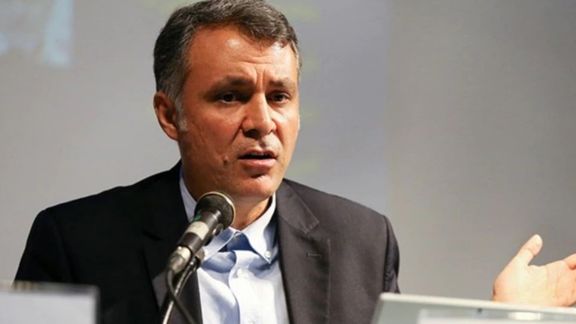
Dismissal of two professors from two of Iran’s top universities has created controversy, evoking memories of purging independent-minded academics in the past.

Dismissal of two professors from two of Iran’s top universities has created controversy, evoking memories of purging independent-minded academics in the past.
Mohammad Fazeli, a professor of sociology at Beheshti University, and Arash Abazari, a philosophy professor at Sharif University, were dismissed in the last few days.
Abazari is well-known for his book Hegel's Ontology of Power: The Structure of Social Domination in Capitalism, which was published by Cambridge University Press. Fazeli’s works focus on sociology of politics and science, especially in the energy sector.
The Islamic Republic has conducted several ‘cleansing’ operations in universities, firing professors that it has deemed not committed to the regime.
The most widespread firings took place right after the 1979 revolution and was peaked again during the presidency of Mahmoud Ahmadinejad, who forced many professors into retirement.
Kaave Lajevardi, a fellow philosopher and translator, called it a disgrace for Iran’s education system, saying that Abazari is not tolerated while many are busy Islamizing the universities.
Abdonnaser Hemmati, the former head of Iran’s central bank who run for president last June, has protested to Fazeli’s firing and called on President Ebrahim Raisi to intervene.
Renowned reformist Abbas Abdi described such dismissals as part of a larger process to destroy the institution of science in Iran.
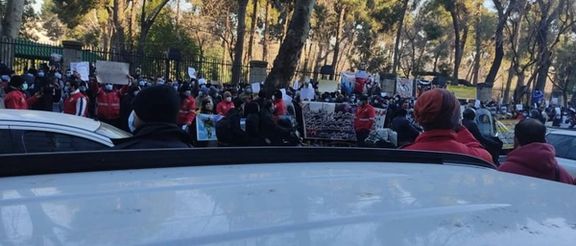
The spokesman for Iran's police says salaries of police officers have increased several times in the current Iranian year, describing their living conditions as a major concern.
In an interview with ILNA on Saturday, Brigadier General Mehdi Hajian said several measures have been taken to improve the living conditions of law enforcement personnel.
“One of the main concerns of the general command is the livelihood of its staff and personnel”, he said, noting that negotiations are underway to provide further funding for the forces.
The news about several raises for security personnel comes as teachers, nurses, industrial workers and others have been protesting for higher salaries amid high inflation, but the government says it cannot afford to pay substantially higher salaries.
Food prices have risen by more than 60 percent in recent months, on top of high inflation in the previous three years. Government figures show that prices for 83 percent of basic food staples have reached a critical level. People living on salaries have cut back on nutritious food, such as meat, fruits and dairy products.
Earlier in the week, hundreds of firefighters held a demonstrationin Tehran to protest their poor living conditions, and last week hundreds of staff members from Iran’s judiciary department took to the streets in several cities while teachers and pensioners have held several rounds of nationwide protests.

Smaller conservative parties in Iran have become more active recently, in what could be a design to shape politics more to the liking of the Supreme Leader.
Every week a new conservative group emerges on the Iranian political scene. Groups that already existed but were less visible, are given a wider exposure on national TV.
Even compared to Majles Speaker Mohammad Bagher Ghalibaf and his aides who call themselves "neo-cons," the new conservatives, the likes of Tehran Mayor Alireza Zakani, are far more ruthless in their quest for power, according to some local media.
While traditional conservatives started forging alliances following former President Hassan Rouhani's victory in the 2013 presidential election, this time, it is a new generation of conservatives that is marching to occupy positions of power and to get ready for the next parliamentary elections in February or March 2024.
Last week, the party known as the Selfless Devotees of the Islamic Revolution held its congress in Tehran. With two other parties, The Society of Sacrificial Warriors, and the Society of Wayfarers, the three groups are known in the Iranian political circles as the Conservative Triplet. The names these groups use can be defined as super-revolutionary labels, but in fact their leaders are nothing more than typical political actors in an authoritarian system who want a bigger piece of the pie.
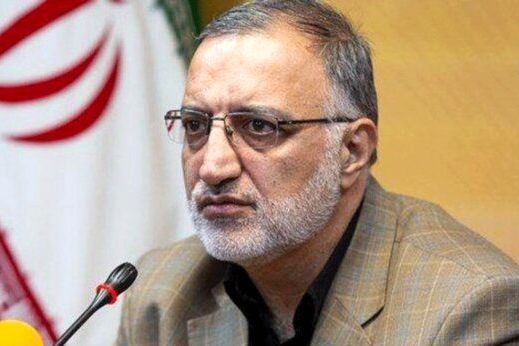
Currently, Iran’s parliament is dominated by the hardliner Paydari group, which has not always followed signals coming from the office of Supreme Leader Ali Khamenei. The re-emergence of the triplet with new momentum, could be Khamenei's policy to introduce them as his favorite so that they could replace Paydari in 2024.
Apart from their leaders, most of the members of the three parties have been hitherto unknown. The Sacrificial Warriors come from a background of former revolutionary guards (IRGC), the Wayfarers are former, or current Basij militia members and the Selfless Devotees are the family members of the veteran soldiers of the 1980s Iran-Iraq war.
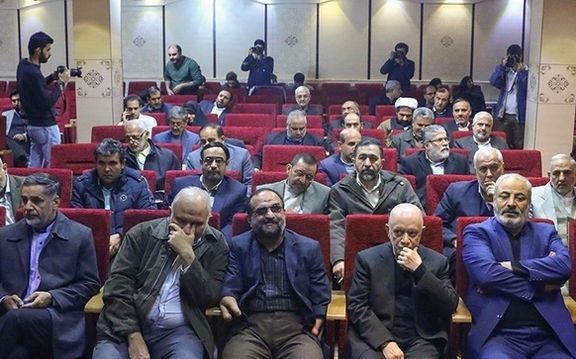
After Alireza Zakani took office as the Tehran Mayor last summer, many of the members of the Sacrificial and the Wayfarers have joined the Tehran municipality as managers. Meanwhile, as some newspapers in Tehran have noted, members of all the three parties frequently take part in news and current affairs programs on state television in a bid to build recognition and credibility for the future.
The Selfless Devotees have their roots in a pre-1979-armed group, which would have been characterized as terrorist if it was active today. The group's name was Saf (Rank) and its members included Yahya Rahim Safavi the former IRGC commander and the current military adviser to Supreme Leader Ali Khamenei. Low-ranking members of that group included current IRGC General Esmail Kowsari who has been a member of the Iranian parliament three times so far and every time he immediately went back to the IRGC to serve as a security officer. Kowsari was, for some time, the secretary-general of the party.
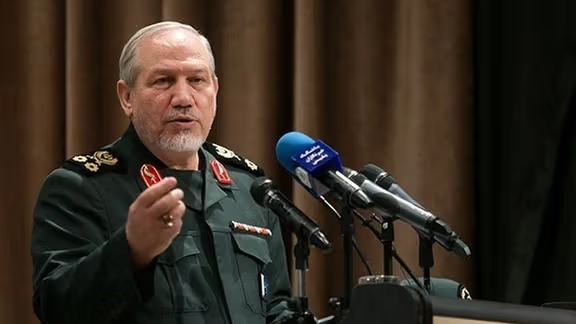
All three groups were formed in the 2000s when the IRGC was beginning to become a major political and economic power in Iran.
Among the three groups, the Sacrificial Warriors is politically more important than the others and has been involved in making all the major decisions of the conservative camp. Former President Ahmadinejad was a member of the central council of this party when he became Iran's president in 2005. Its members include powerful conservative politicians such as Ali Darabi and Hassan Fadaei. The former was the deputy chief of the state television under three different heads of the state TV.
It appears that the three groups are preparing to seize the parliament and dominate the presidential administration as the "young revolutionaries" Khamenei wants for his ‘second step of the revolution,’ his jargon for his vision of Iran in the next 40 years.
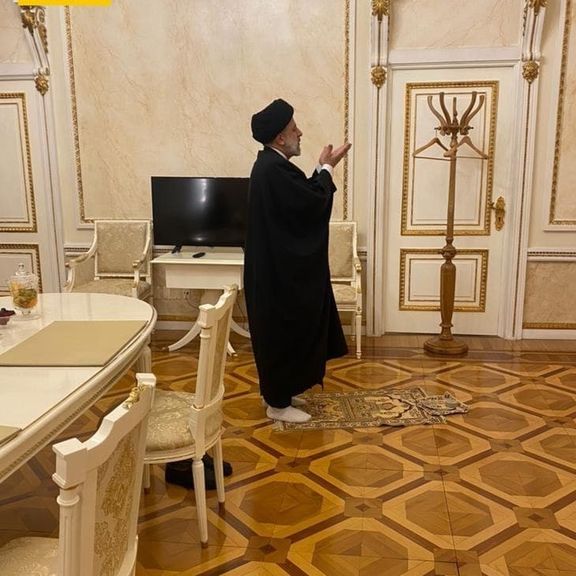
Supreme Leader Ali Khamenei's representative in Alborz province says President Ebrahim Raisi will offer Islamic prayers at the White House someday.
Mohammad-Mehdi Hosseini-Hamedani, a cleric, said in his Friday Prayer that Raisi’s prayers at Kremlin conveyed a very important message.
A photo of Raisi praying at the Kremlin during his meeting with Russian President Vladimir Putin has been advertised by many officials and followers of the Iranian president, including his wife that described it as a revelation of spirituality.
The photo has been used extensively in what appears to be a publicity campaign for Raisi amid public criticism of his government's efforts to expand relations with Russia and China. Among Iranians the names of both countries are associated with communism and atheism.
During their Friday Prayer sermons, representatives of Khamenei all over the country praised the image, calling it an important event.
Mohammad Ali Nekounam, the Friday Prayer leader of Shahrekord, described Raisi’s prayers at Kremlin as a “conquest” and the Friday Imam of Esfahan said it showed that “We only rely on God”.
The contents of Friday Prayer sermons delivered by Khamenei's local representative in various cities are dictated by two state bodies close to Khamenei's office, officially known as "The Policy-making Council for Friday Prayer Imams" and the "Friday Prayer Headquarters," both dominated by hardliner clerics.
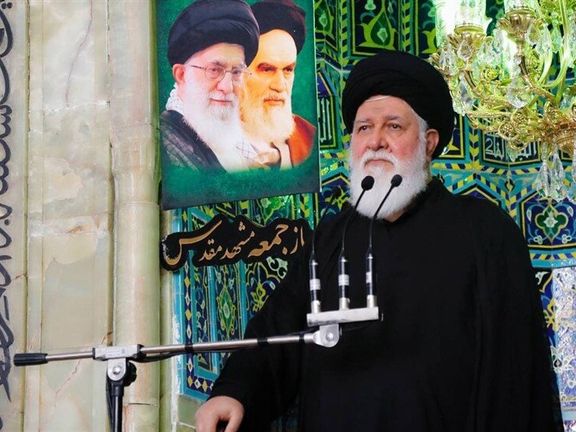
Iranian hardliner cleric Ahmad Alamolhoda says women with loose-fitting hijab should not feel secure in public, urging people to express hatred towards them.
During his Friday Prayer sermon, Alamolhoda – Ali Khamenei’s representative in Mashhad and father-in-law of Iran's President Ebrahim Raisi – said that women with loose hijab should feel the hatred, stressing that “expressing hatred and disgust for a woman without hijab is a divine duty”.
“People should solve the problem, not the police”, he said. His remark could be seen as a green light for religious zealots to confront women in the streets and cause harm.
Similar calls for crackdown on those who fail to comply with compulsory hijab by other hardliners sparked a series of acid attacks on women in Esfahan in 2014.
He also talked about an official ban on women not to enter soccer stadiums, saying, “Stadiums are a place of excitement”, stating that women should not be excited in the presence of men.
His comments came less than a month after hundreds of Iranian social media users protested to compulsory hijab and the ideology the government is imposing on them, trending the hashtag #LetUsTalk.
A report by the parliament's research center in 2018 said the number of Iranians who believed in mandatory hijab had waned. According to the report those who considered the hijab a value that could be stipulated in law had fallen from 85 percent in the early 1980s to around 35 percent.
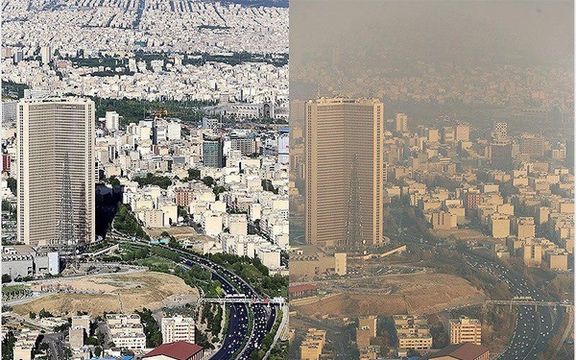
With a cold spell gripping Iran this week, shortages of natural gas have become acute and power stations are burning more dirty fuels, feeding air pollution.
Turkey’s announcement on Thursday that Tehran has cut gas deliveries signals the critical situation Iran is facing in keeping its own citizens warm and providing electricity. The country has the second largest reserves of natural gas in the country but is barely able to satisfy domestic demand.
An article published by the Islamic Labor News Agency (ILNA) in Tehran on Friday provides a bit more details about the natural gas crisis, based on information from an official of an industry group representing companies that run power plants in Iran.
Mohammad-Reza Zahed told ILNA that power plant operators are not happy when they are forced to use mazut, a dirty, unrefined oil product that most countries have banned. The fuel harms power plants and leads to heavy pollution in urban centers, but they have no choice as they gas deliveries in winter and summer are halved.
Electricity generation in Iran needs around 220 million cubic meters of gas per day, while in January deliveries declined to 100 million cubic meters. The government that controls fossil fuel production, cannot export mazut in large volumes and power plants have no choice but to use what is delivered to them.
Officials in recent weeks have already warned of high smug and pollution in cities, especially as precipitations and high winds of the past ten days comes to an end.
Iran’s gas fields, suffering from lack of Western technology and investments, are not able to keep up with domestic demand. Zahed told ILNA that annual consumption stands at 210 billion cubic meters (7.4 trillion cubic feet). Residential and commercial consumption is 105 billion cubic meters, while power stations use 60 billion and heavy industry another 40 billion cubic meters of gas.
Zahed also revealed another interesting information. Power stations must pay fines for pollution while they have no choice in burning mazut, which the government imposes on them.
The industry insider blamed lack of gas deliveries also on the distribution system, explaining that pressure in pipelines fall off because of insufficient pumping capacity. He added that power plants in the south of the country get more gas because of their proximity to production sites, while plants in the north have to rely more on mazut.
Mohsen Khojastepur, general director of the Iranian national oil company said in October that if investments in the gas industry are not secured to the tune of $50 billion, Iran will become a net importer in the coming years.
Oli minister Javad Owji has said that around $150 billion is needed to revitalize oil and gas production, but Iran has been hit by US banking sanctions and is isolated from the international financial system. Even without sanctions, few investors would risk large lending to Iran, knowing about the risk of unexpected developments related to its domestic and foreign policies.